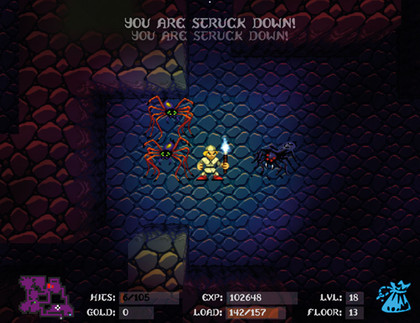Crowdfunding: what it is and why it's important
We explore the murky world of crowdfunding
Sign up for breaking news, reviews, opinion, top tech deals, and more.
You are now subscribed
Your newsletter sign-up was successful
By making the developers realise that an unserved audience is there, desperate for games, Kickstarter is changing development. For developers, it also means that they can talk to their community about the game; for many, no part of the publishing or marketing model was working.
Tim Cain, now at Obsidian, says: "With Kickstarter, we are free to talk about the game during all the stages of its development. We have a better idea of what features are important, and the fans can follow the game's development and be more involved with it."
Kick in the teeth

There have been high profile failures though. Wizardry lead designer Brenda Brathwaite and Doom creator Tom Hall pulled their Kickstarter for an 'old school RPG' because they felt that fans were funding it without actually knowing what it was.
It's noticeable how many games projects have focused on nostalgia rather than innovation. All the largest and most successful projects have been adventure games and RPGs - genres that have been stagnant for a long time. Worse, Haunts, a small horror game, received $28,000 from Kickstarter, but the developer had to put the project on hold indefinitely, as it had run out of money and programmers.
Given that most punters go for the cheapest option that will give them a copy of the game, the 12,000 people who funded Haunts may feel aggrieved. They thought they were pre-ordering a game, but if it shuts down then they've lost their money.
And not all Kickstarters get funded. If you're a small indie with no big names, you have to aim much lower in your goals - and be prepared to do so. Dinofarm Games' Keith Burgun has talked about the failure of the Kickstarter for his tactical dungeon-crawler Auro, emphasising the need for good communications.
Successful pitches on Kickstarter are supported by a reasonable video, regular blog updates, sensible goals and attractive payment tiers. Burgun recommends playing it straight and waiting until you've got something to show. And if you don't get the cash, don't be discouraged; work out why not and try again.
Sign up for breaking news, reviews, opinion, top tech deals, and more.
Philippe Chetrit, CEO of event crowdfunding platform Tixelated, agrees. The key to a successful campaign is a clear and precise return on a contribution, he says. "We've seen countless campaigns fail on our platform due to people's faith in a good idea."
Carlos Solorio of clothing Kickstarter Arden Reed says competition is increasing, and that "Campaigns are getting more sophisticated. Now companies going into a KS campaign are usually advised by several mentors and consultants - not to mention the professional videographers/screenwriters that have emerged from this industry."
Publishers are learning too. They won't become extinct, but they will have to change. "It's pretty scary when you're a publisher and you have to fund games because that's what you need to go ship," says Obsidian's Feargus Urquhart. "But now maybe some titles can come to you secondarily, or for distribution, or something like that where you don't have to worry about a cash outlay so much. For the $20-40 million multi-SKU console game, that's not the Kickstarter world. But for titles cheaper than that, he says: "we're getting the opportunity to go build a brand, and it's a brand that we own. And that's what changes the power a little bit."
The new wave
One interesting new platform is Gambitious, which offers the crowd equity in the project (so if the game makes a profit, the funder gets some money back) and acts like a publisher. "It's crowdfunding 2.0 - newwave publishing," explains one of the sitefs founders, Andy Payne OBE. "It's not just raising lots of money, it's making sure the project goes somewhere. We're going to have a board of experts to help developers get their pitch right, make money out of it and act as guarantors."
"Games are getting more expensive to make. When I started, apps were £50,000. Now it's £250,000. It will be up to millions on pocket computers in a couple of years. I think we'll see hybrid models - a bit of crowdsourcing to prove a concept is popular, then equity, then bigger equity coming in to take bigger slices. A hierarchical wisdom of crowds model."
It's likely that Kickstarter will adopt elements of this, especially now that the JOBS (Jumpstart Our Business Startups) Act has passed in the US - something designed to reduce regulation on crowdfunding.
As Money Crasher's Andrew Schrage told us, analysts predict the JOBS act will help the industry grow to $500bn in 2013. But growth in new industries tends to mean consolidation - or venture capitalists buying everything out.
Payne predicts Kickstarter will be bought soon. "They're the Facebook and Twitter of crowdfunding. They have a fantastic vertically sliced community, and make lots of money from their transaction model. They will probably sell themselves to a financial institution - banking or venture capitalism."
For the future, Solorio feels the platform is "crossing the chasm" to mainstream crowdfunding. "I think you're going to start seeing entire industries shift to this funding platform. Especially those that were constrained by outsized capital needs."
Of course, with the Western economies still in the doldrums all capital is constrained, so perhaps every company will shift to Kickstarter. Perhaps the crowds aren't so mad after all.